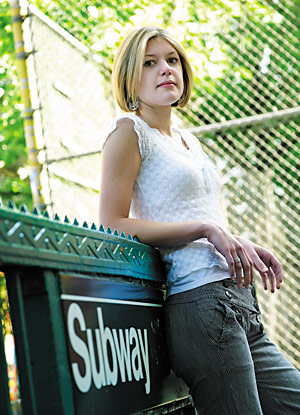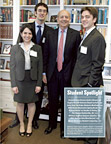Students Get Funds to Spring Into Action During Break
Printer Friendly Version Mimi Franke ’08 calls her first semester of law school a “total daze,” but nonetheless mustered the energy by the end of the year to focus her attention on those in need.
Mimi Franke ’08 calls her first semester of law school a “total daze,” but nonetheless mustered the energy by the end of the year to focus her attention on those in need.
“I couldn’t believe I hadn’t done anything to address the issues our country was facing after Hurricane Katrina,” said Franke, who as an undergraduate ran Vanderbilt University’s alternative spring break. With 400 students traveling to multiple countries annually, it is Vanderbilt’s largest student-run organization. Franke contacted fellow members of Law Students for Human Rights (LSHR), who in turn directed her to the Student Hurricane Network (SHN), a national organization formed by law students to address the aftermath of Katrina.
With SHN’s assistance, Franke spearheaded a trip to the area in March 2006 during the Law School’s spring break. Thirty students—eight were sent to Gulfport, Mississippi, and the rest to New Orleans— worked with a total of nine local organizations, pitching in on such pressing matters as the repair and demolition of storm-damaged homes, the preparation of written testimony for the New Orleans City Council on urgent local issues and the monitoring of eviction proceedings in Mississippi.
The trips were so successful that Franke contacted Assistant Dean Deborah Ellis ’82, the head of the Public Interest Law Center (PILC), to see how she could make it an annual project. The two worked together to launch a permanent Alternative Spring Break (ASB) program and to petition the Law School for funding. The arrangement they struck makes LSHR responsible for the planning and logistics, while PILC provides funding for travel and accommodations.
In March 2007, the first official ASB sent 34 students to three different sites. One group returned to New Orleans to aid government agencies and community and humanitarian organizations; a second group ventured to Miami to advocate for immigrant rights; and a third group worked with legal service organizations on behalf of the disadvantaged and disenfranchised in the Bronx, the poorest urban county in the United States.
Franke entered the picture at the right time. The Law School in general, and Dean Richard Revesz in particular, was interested in supporting such a program, Ellis said, but “nobody had quite the momentum and organizational know-how to do it until Mimi came along.”
Isaac Cheng ’08 volunteered in New Orleans in 2006 and again this year, helping with community organizing and political action on behalf of immigrant workers and of residents displaced from housing projects. “They don’t have complicated theories about what happened,” he said. “They just have a really straightforward response, which is, ‘Come back and rebuild.’”
Some student participants who stayed closer to home were reminded of the tremendous need, everywhere, for legal assistance. Jessica Chicco ’07 devoted the week to Legal Aid’s Juvenile Rights Division in the Bronx. She spent much of her time combing the archived files of two different cases for specific information involving a mental retardation diagnosis and evidence of sexual abuse. “We did substantive work,” said Chicco. “I was kind of skeptical about getting anything done in five workdays, but we really did. And I learned a lot. It’s a complete immersion.”
Many students, said Franke, were surprised at how important their work was: “I put that as an incredibly good sign, one, that the organizations were actually utilizing the students but, two, showing that they really are in need of student help.”
Franke feels the ASB can make a dent in such overwhelming need. “Even outside of some natural disaster,” said Franke, “it’s extremely important for those of us who are going to hopefully assume positions of leadership and power in our country to understand…the legal struggles that many people are facing every day: a poor family in New Orleans trying to deal with insurance claims, or a legal resident challenging his detention or immigrant status, or somebody in the Bronx in need of civil legal services.”
